Six recent undergrad and grad alumni tell us what they’re currently up to, what surprises them about their current work, what they’ve found valuable from their training as a UBC linguist, and what they miss most since leaving.
Blake Allen (Ph.D. 2016)
Nowadays I’m a Director within the engineering organization at Yelp: my group handles consumer-facing UX feature development across phone and website platforms for the high-traffic screens like the home screen, search results, and business details pages. Apparently my work at UBC on digital language corpora (especially PCT with Kathleen) and the statistical/computational content from my dissertation work were enough to get my foot in Yelp’s door!
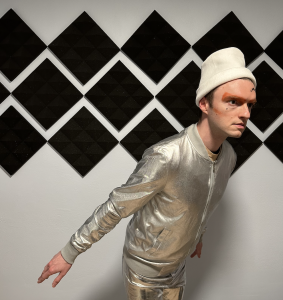

Blake Allen as David Bowie
This might sound cheesy, but it surprises me sometimes how much my grad school experience prepared me to be a manager in industry. I don’t get to directly do anything related to linguistics (unfortunately!) but all the formal systems thinking that goes into building linguistic theory was definitely a good framework to build on. And as a manager, 80% of what I do involves fostering better communication and collaboration, which I remember being so critical in grad school.
I really miss how connected UBC linguistics people were with lots of collaborators outside UBC! It was so exciting getting to meet someone from totally different universities when I was at conferences, and then kicking off unexpected collaborations. In industry, each company tends to only work within itself (or in very structured ways with specific partner companies) so I look back really fondly on this openness.
Lauren Denusik (B.A. Hon. Speech Sciences, Minor in Commerce, 2020)
I am in my fourth year of a five-year combined Masters/PhD program at Western University in London, Ontario. In December 2023, I completed all the requirements for my clinical Master’s in Speech-Language Pathology and started working part-time as a speech-language pathologist, while continuing to work on my doctoral research in Speech and Language Sciences. For my PhD, I am completing a variety of practice-based research projects focused on the role of SLPs supporting young autistic children and their families. I have been teaching a course in my department on Developmental Speech Disorders.
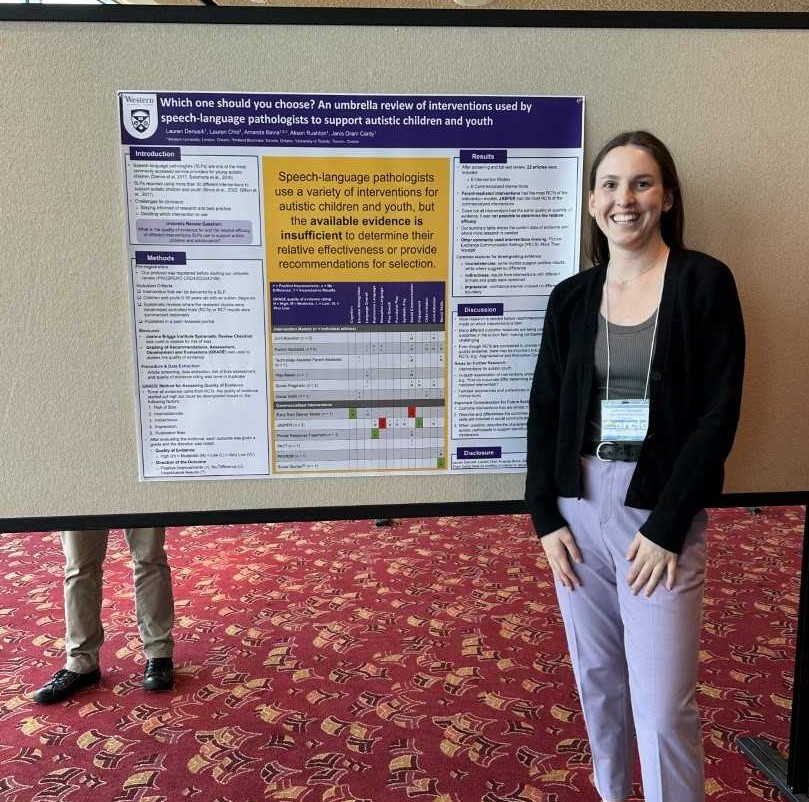

Lauren at SRCLD 2023
The best and also most surprising thing [about my current work] is the opportunities I have to integrate my clinical work and research. Having the opportunity to work directly with families and clinicians has helped guide new research projects and motivates me to continue my research, as I can see the need and impact it can have on families. Although it can be tiring to balance multiple demands, it is extremely rewarding.
What I miss the most is the community of students and faculty. Although UBC is a large school, the Linguistics department always felt like a small community … Also I miss Vancouver sushi daily.
Khia Johnson (Ph.D 2021)
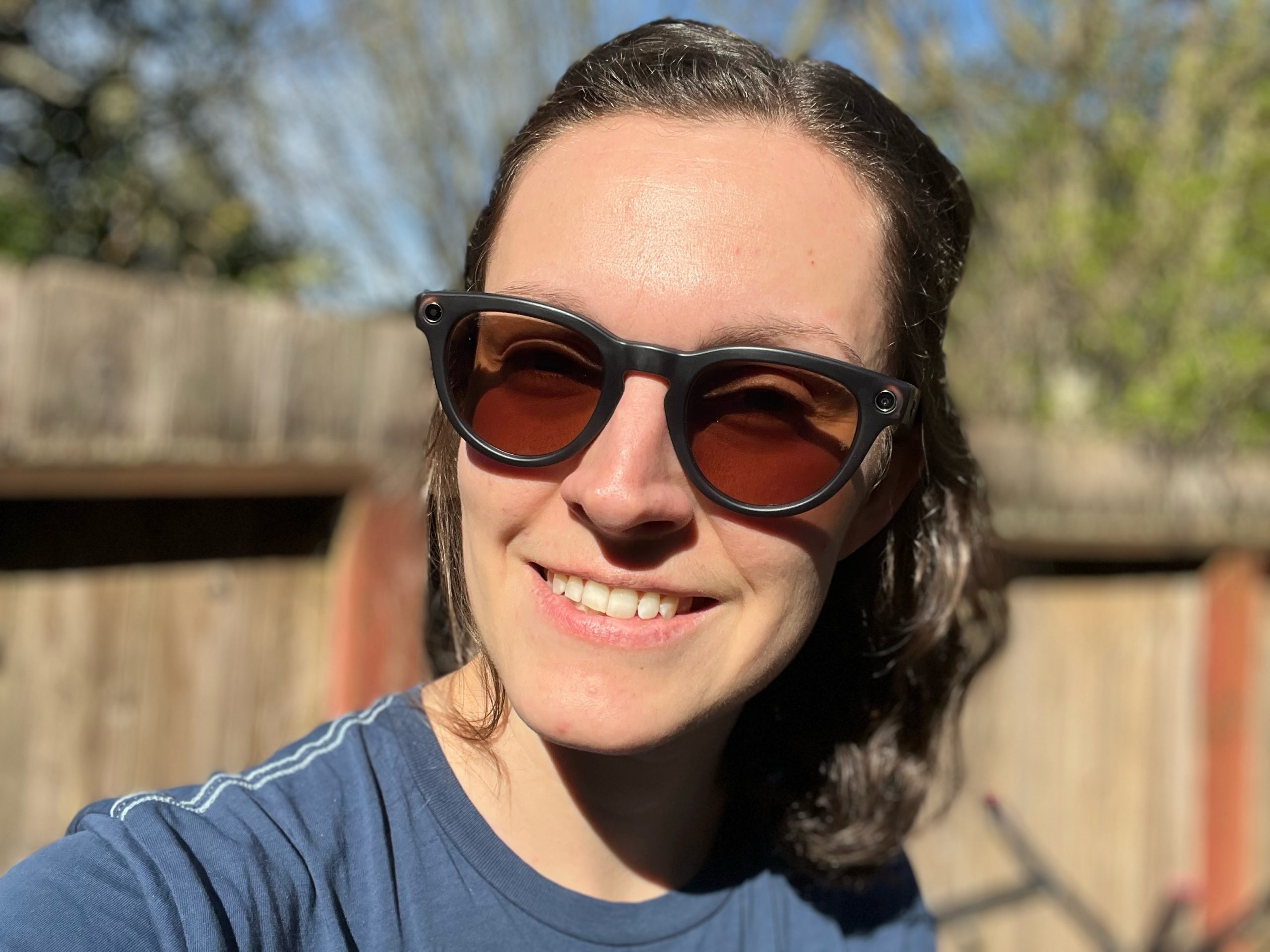

Khia wearing RayBan Meta smart glasses
I’m currently working as a UX Research Scientist in the Reality Labs Research division at Meta. I conduct lab and survey based studies to explore and evaluate novel audio technologies and experiences for smart glasses, augmented reality, and virtual reality.
I was initially surprised at just how much money companies will spend on user studies! Which is a lot, but perhaps still just a drop in the bucket for Meta-sized budgets. One of the challenges has been getting used to the faster pace, and learning to prioritize what I’m working on ruthlessly. But I love that I get to do impactful research that has a chance of reaching millions of consumers.
[What was valuable in my training?] Lots of things! Experimental design and statistics, but importantly, being able to tell a story and communicate my findings to people outside of my narrow discipline. I’m also in the unusual position of being able to use my speech perception and production subject matter expertise.
Paris Gappmayr (B.A. Hon. Speech Sciences, 2020)
I’m currently a fourth -year PhD student at Boston University in the Speech, Language, Hearing Sciences program, studying the acquisition of American Sign Language (ASL). My dissertation will use eye-tracking technology to study how signers shift their visual attention between the face and hands during ASL perception. I’m particularly interested in whether gaze patterns differ between deaf vs. hearing signers and/or signers who acquired ASL early in their life vs. later.
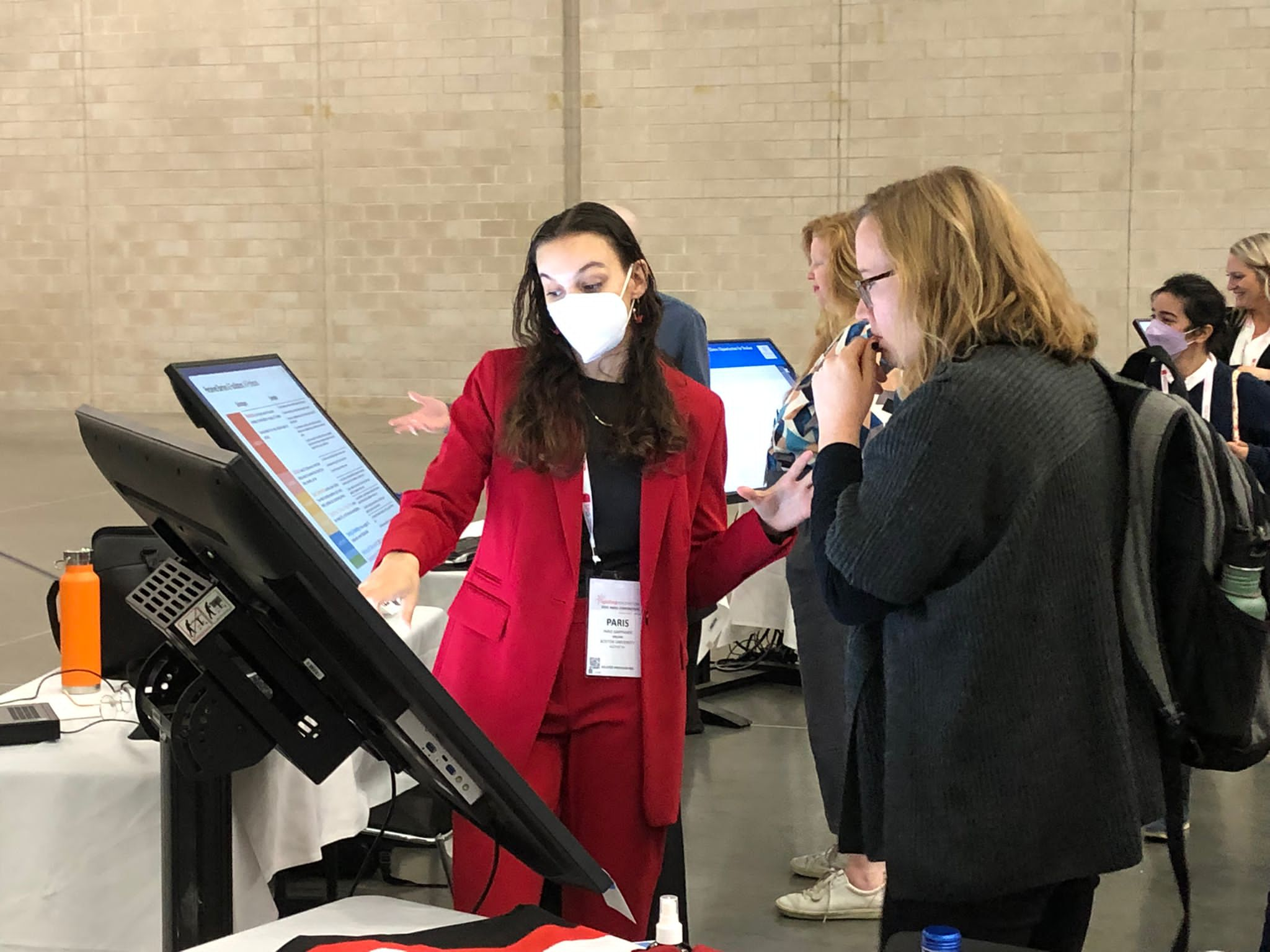

Paris at ASHA 2023
The best thing about my current path is that I get to spend my time learning more about an understudied language and modality that I am deeply interested in exploring. I work in a signing lab, with many Deaf colleagues, so I have been immersed in ASL. […] The most surprising/challenging thing has been learning how much of the academic career path relies on un- or under-paid labour. At the time of writing, my grad-worker colleagues and I are on strike due to ongoing unfair labor practices, while we negotiate our first union contract. I have been surprised by how transparently administrations treat university institutions like corporations instead of places of education.
My undergraduate coursework prepared me incredibly well for my grad school classes, in areas from formal/theoretical linguistics to applied psychology. In addition to coursework, my experience of completing an Honours thesis in Speech Science—from conceptualizing a hypothesis, to writing the results—offered incredible preparation for my research in grad school.
Alexander Angsongna (Ph.D, 2023)
I am currently a postdoctoral research fellow at the Department of African Studies (Linguistics & Literatures) at the University of Vienna, Austria. I currently teach two courses: Language Diversity, and Language and Politics in Africa. Here I am also part of an ongoing research project which focuses on standard orthographies and tone phenomena of Mabia (Gur) languages.
The best part [of my new job] has to be the opportunity to work in a new and completely different environment and share research ideas with new people. It has also been quite challenging, working in a new place where I basically know no one, but again I take it as a positive challenge because I feel like it will push me out of my comfort zone to blend with my new society.
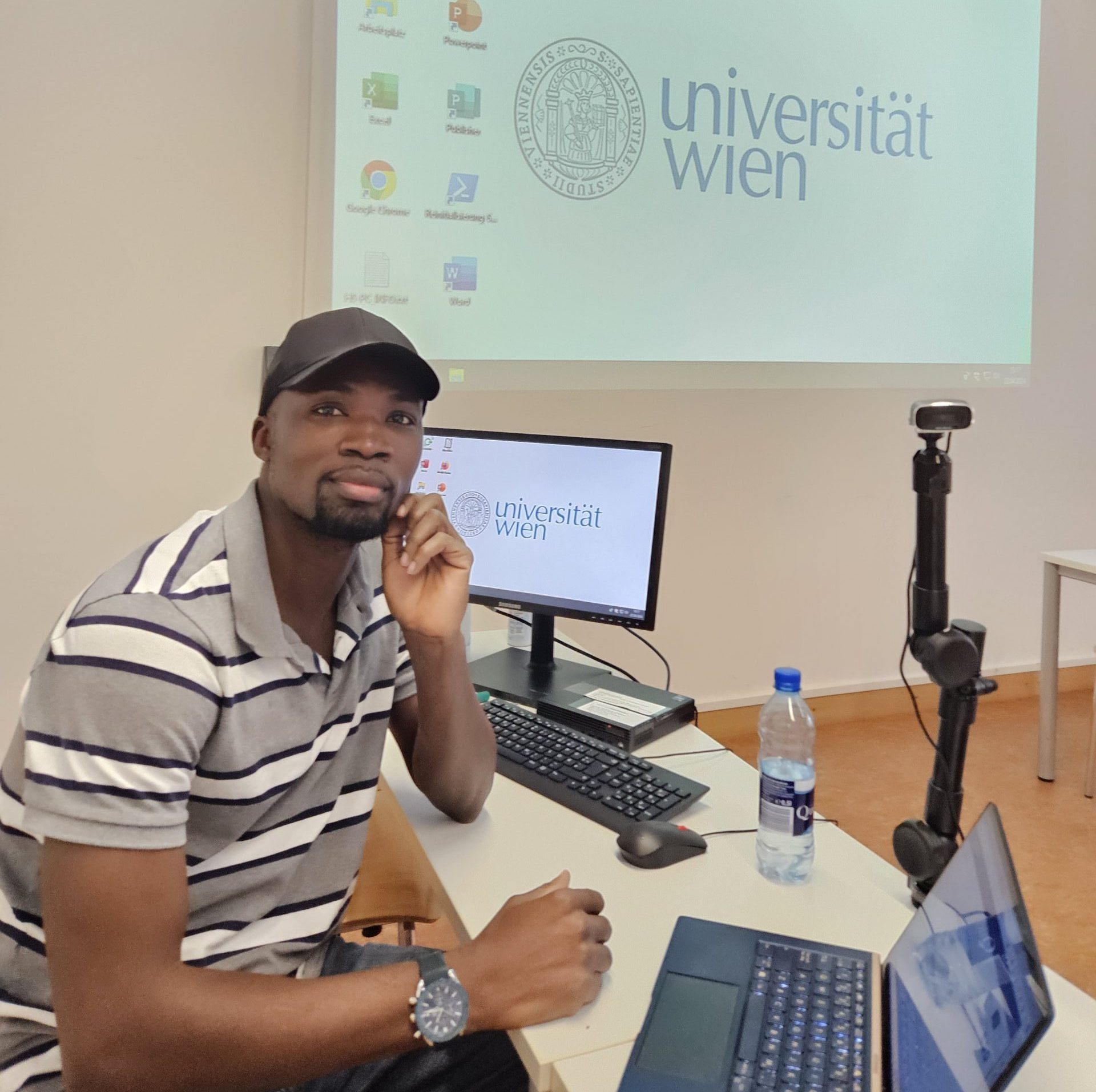

Alex hard at work
My most valuable UBC training was in conducting independent research, benefiting from the patience, understanding and the professional attitude of my supervisors and instructors. The experience of working as a teaching assistant has also been so valuable in my current role. These were some of the most valuable aspects of my time at UBC Linguistics and now I am striving to replicate that experience with the students I teach.
What I miss most is the regular presence and support of my supervisors. Sometimes, we take for granted such things until we step into the next phase of our lives. The feeling of having someone to talk to, someone to advise and guide your research process is simply priceless! I also miss the random linguistic conversations I had with student colleagues in the department.
Yurika Aonuki (BA Hon. Linguistics, 2019; MA, 2021)
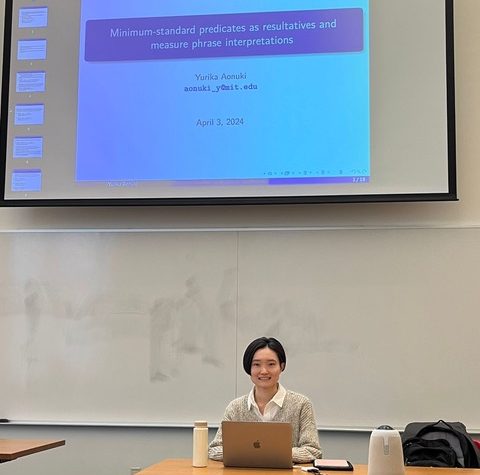

Yurika gives a talk
I’m a second year PhD student in linguistics at MIT. I’m still working on semantics in Gitksan (a huge thank you to the Gitksan Lab for their continuing support!) and Japanese. I’m currently thinking about degrees and conditionals.
The most valuable part of my UBC training was the emphasis on fieldwork and collaboration. I had the best training I could have ever asked for. I really miss the department community, including all the animal friends!


